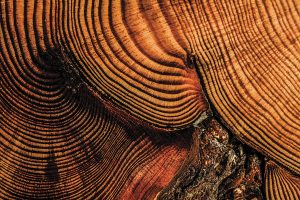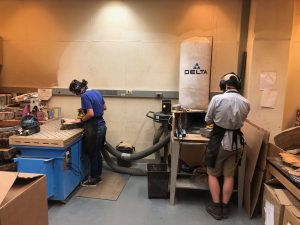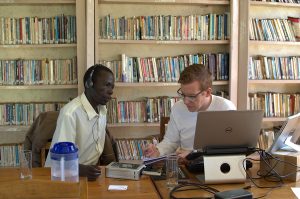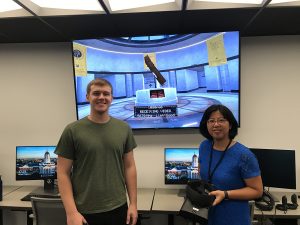Ask Mike Stambaugh to nutshell the arc of his research career and he starts with just that — nutshells.
“I did research in forestry at Mizzou, and one of my duties was to separate the meat from the hull in walnuts,” said Stambaugh, an associate professor of forest ecology in the School of Natural Resources and director of the MU Tree-Ring Laboratory. “The undergraduate research experience took away a lot of mystery for me about what happened behind closed doors. It made me feel important and part of a team.”

MU researchers analyze trees, such as this circa 1686–1813 red pine section from Wisconsin, to look back in time.
Stambaugh’s lab is one of dozens of groups presenting cutting-edge research opportunities and student success resources at the Undergraduate Research Fair from 11 a.m. to 2 p.m. Friday, Aug. 20, in the Bond Life Sciences Center. His team of dendrochronologists — researchers who study the science of tree rings — use data to advise land managers on prescribed burns, predict drought cycles and more.
“Some of the best historical information comes from tree rings, and we think of the pieces of wood as books,” said Stambaugh, who will be displaying several eye-catching specimens at the event. “We help tell a story that includes humans, climate and the environment. We interpret the periods of time and what it implies for today.”
Stambaugh earned all of his degrees from Mizzou — bachelor’s, master’s and doctorate — a journey that began with hands-on undergraduate research. It’s part of the reason he is so enthusiastic about including younger Tigers in his lab.

Dendrochronologists at MU use tree rings to reveal answers from the past.
“We’re always looking for great students,” Stambaugh said. “If you’re interested, stop by!”
Associate English Professor Michael Marlo’s academic trajectory was also influenced by his early research experiences. A researcher of African linguistics, Marlo often referenced the Kenyan language he studied as an undergraduate throughout his academic career.
Now, among other projects, Marlo heads up “Documenting Luyia Together,” a team of student researchers dedicated to cataloguing languages from the Luyia cluster spoken in Kenya and Uganda. The project is part of the ASH Scholars Program, a collaboration between the MU Honors College and the Office of Undergraduate Research highlighting arts, science and the humanities.

Michael Marlo’s research documents languages in East Africa.
“Undergraduate research has totally reshaped paths for my work because of the students making their own discoveries and pushing their own ideas,” said Marlo, whose team members have traveled to Kenya to record indigenous folk tales. “I enjoy working with students over time as they advance and find the next questions to ask.”
In Fang Wang’s virtual reality lab at the College of Engineering, students are answering questions. For a special assignment unveiled at the Missouri bicentennial celebration, Wang’s class was tasked with designing a virtual museum to display 98 paintings in the Missouri: Heart of the Nation collection. The virtual reality (VR) environment allows patrons to “wander” the exhibit and observe the paintings up close — perhaps even more closely than one would in real life.

Sam Nichols and Fang Wang challenge students to explore limitless spaces in the College of Engineering’s Virtual Reality Lab.
“This project allowed students to put their skills to use in a real-world application where people are going to download and consume the content,” said Wang, an assistant teaching professor in the Information Technology Program. “We’re looking into sculpture for the next project to see how we can use photos from different angles and use artificial intelligence and make it look like the real thing at a museum.”
Undergraduate Research Fair Schedule
Friday, Aug. 20, 2021
McQuinn Atrium in the Bond Life Sciences Center
11 a.m.–Noon
- Rocio Rivera (Animal Sciences): Examine cow and mouse oocytes and embryos using a microscope
- Candy Sall, Jessica Boldt, Alex Jones (Museum of Anthropology): Look at a variety of archaeological samples and discuss modern analytical techniques
- Prasad Calyam, Alicia Esquivel Morel, Rounak Singh (Electrical Engineering & Computer Science; CERI Center): Demo drone prototype hardware and cloud algorithms to do real-time video processing
- John Henry Adams, Kimberly Moeller, Rachel Brekhus, Lily McEwan (University of Missouri Libraries): Sp2021 undergraduate research in Special Collections exhibit; library tech tools.
- Rachel Newman, Erik Potter, Iman Poostdoozan (Fellowships & Advanced Studies)
- Anne-Marie Foley (Office of Service Learning): Learning in the Community
- Office of Undergraduate Research
Noon–1 p.m.
- Candy Sall, Jessica Boldt, Alex Jones (Museum of Anthropology): Look at a variety of archaeological samples and discuss modern analytical techniques
- John Henry Adams, Kimberly Moeller, Rachel Brekhus, Lily McEwan (University of Missouri Libraries): Spring 2021 undergraduate research in Special Collections exhibit; library tech tools.
- Mike Stambaugh, Joe Marschall (School of Natural Resources): Examine tree-ring specimens
- Fang Wang, Sam Nichols (Information Technology): View the interactive virtual reality art exhibition of “Missouri-Heart of the Nation.” Display Scruggs-Vandervoort-Barney Collection from UM Museum of Art and Archaeology to celebrate Missouri’s 200th anniversary.
- Rachel Newman, Erik Potter, Iman Poostdoozan (Fellowships & Advanced Studies)
- Anne-Marie Foley (Office of Service Learning): Learning in the Community
- Office of Undergraduate Research
1–2 p.m.
- Paula McSteen (Biological Sciences): Compare giant corn plants with modern agricultural varieties
- Chris Josey (Communication; ASH Scholars Program): Present research on social-identity focused news
- Michael Marlo (English; ASH Scholars), Bobby Love, Miya Russell and Caroline Topham: Linguistic documentation of understudied languages
- Rebecca North, Crystal Rein (School of Natural Resources): Measure water clarity using a secchi disc.
- Rachel Newman, Erik Potter, Iman Poostdoozan (Fellowships & Advanced Studies)
- Anne-Marie Foley (Office of Service Learning): Learning in the Community
- Office of Undergraduate Research